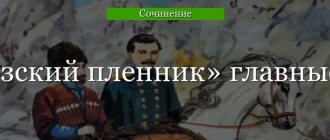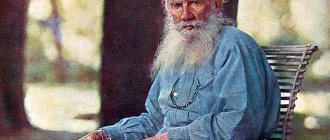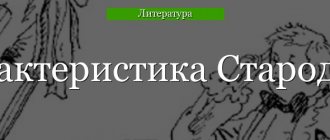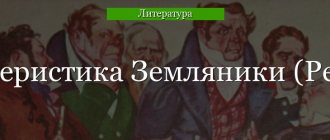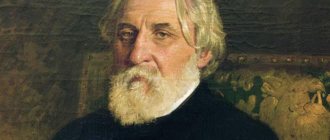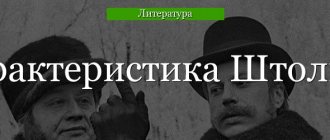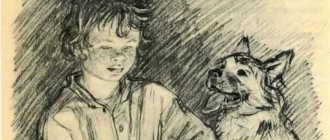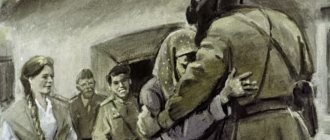Character mystery
The first thing the reader learns about Kostylin is that the hero does not serve in the most advantageous place. For what reasons a wealthy nobleman ends up in the Caucasus during hostilities is unknown. Many officers sought to get there for the fastest promotion and to receive another award. But most of them received a position somewhere at the headquarters, in safe cities, and Kostylin serves where it is impossible to leave the fortress without being accompanied by armed guards. Maybe he got there by the will of his superiors because he committed a fine, participated in a duel, for example. Or, for romantic reasons, he wanted to fight in a real war. Tolstoy does not explain his motives. But in any case, this fact makes the character’s image more intriguing than it seems at first.
Popular topics today
Victor Hugo's novel The Man Who Laughs takes place in England. Tragedy is at the center of events. Gwynplaine's life began well. He was born to Lord Linnaeus of Clancharlie
As in any type of literary (including oral) creativity, fairy tales also have their own genres: everyday, boring, fables, tales about animals.
I want to tell you about a wonderful place called Ryazan, about its latitudes, wonderful streets, unforgettable sunsets, about its ancient and fascinating history. Ryazan is considered one of not just the oldest
One of the outstanding works of culture of ancient Rus' is the poem “The Tale of Igor’s Campaign.” Thanks to him, we see the events of that distant time, the thoughts and deeds of the people who lived in that era.
It is unimaginable to confuse Bunin’s works with poems by other authors. His poetic works, created throughout his creative career, were distinguished by deep philosophical reflections.
Source
Captivity
Spoiled by a wealthy life, Kostylin tries to choose an option that would cause him the least inconvenience. Instead of trudging through the heat with a slowly moving convoy, it is better to go ahead and quickly, without stopping, reach the goal. The reader knows what this decision led to.
Having been captured, Kostylin immediately abdicates all responsibility for his fate. Now his life is in the hands of his enemies, and he relies on their goodwill. The officer does not even try to negotiate anything with the Tatars; he unquestioningly agrees to the demands put forward. This is the first episode to demonstrate the enormous difference between the two Russian prisoners. The matter does not come down to a primitive division: one is bad, the other is good. Kostylin is an honest, decent person, but he is completely unaccustomed to being responsible for himself. Having asked his relatives for a ransom, he handed over to them concern about his future and is simply waiting for him to be released. While Zhilin knows from the very beginning: no one will get him out of captivity, he must get out himself.
The heroes demonstrate opposite life positions. If Zhilin is an active participant in events, a subject shaping reality, then his comrade is a passive observer, an object of external influences. For him, captivity is wasted time, a period lost from a full-fledged existence. Kostylin does not live in captivity. He sleeps all day in the barn, swells, weakens, loses his will and ability to act. At the same time Zhilin
- prepares an escape, digs a tunnel;
- explores the surroundings;
- observes the life of the village, the morals, customs, and rituals of the inhabitants;
- accustoms dogs to himself;
- strikes up a friendship with Dina, which makes his imprisonment easier and ultimately saves his life;
- gains the trust of the local population;
- He's always making something.
For him, life in captivity does not end. Of course, it is unbearable, difficult and dangerous, dirty and humiliating. The officer is starving, sleeps on a pile of manure, he is cut off from his loved ones, he is among people who are strangers in faith and language, but he lives, acts, thinks, communicates, makes plans, and Kostylin simply spends empty hours and days in agonizing anticipation.
Contrasting Kostylin and Zhilin
Kostylin and Zhilin are the two main characters of the story. Although they find themselves in the same conditions, they behave completely differently. Zhilin did not lose his sense of pride and remained true to himself. Even in captivity, he does not sit idle. He established himself among the Tatars as a good master and doctor, and ensured that they were fed and allowed to sleep without shackles. Kostylin did nothing, but simply humbly waited for a huge ransom to be paid for him.
The author is clearly more impressed by the independent and resilient Kostylin. These two became “Caucasian captives,” but if Kostylin completely submitted to the Tatars and was even ready to die without trying to resist, then Zhilin did not lose his fortitude and self-confidence, which saved him.
This article will help 5th grade schoolchildren write an essay on the topic “Characteristics of Zhilin.” It describes the external characteristics of the hero, his behavior in various life situations.
Source
The escape
The character's inactivity played a cruel joke on him during his escape. Unaccustomed to movement and walking, a plump man quickly gets tired and out of breath. Boots make your feet bleed. The rich gentleman cannot walk barefoot at all. He makes a mistake that is disastrous for the fugitives when, unable to resist, he screams loudly in pain, knowing that there is a horseman nearby who, in the first village, will tell about the scream in the night forest. In the end, the heavy officer is dragged by Zhilin. Kostylin begs his comrade to leave him. The reason for this “noble” behavior lies, most likely, in the fact that it is more difficult for him to continue on his way than to sit still. And this hero, as already said, always chooses the easier and simpler path.
Planted in a damp hole, Kostylin evokes pity. His legs become swollen and covered with ulcers, he constantly groans and moans, his health is visibly deteriorating. Zhilin is probably not happy either, but there is no time to think about his troubles, because, perhaps, he has only a few hours left to save himself.
Helping his comrade get out of the hole, Kostylin shows his best qualities. Not wanting to become a burden again, he flatly refuses to run, although usually this driven, weak-willed person allows himself to be persuaded. The Tatars, having not found one of the prisoners in the morning, will understand that they could not do without the help of the second. This threatens Kostylin with punishment, or even death. This time the hero acts truly courageously and nobly. Zhilin owes his salvation to him almost to the same extent as to Dina.
Detailed characteristics
Kostylin is one of the negative characters in Leo Tolstoy’s story “Prisoner of the Caucasus,” a Russian officer who was captured by the Tatars. Outwardly, he is an overweight, fat and clumsy man. He went on vacation, and on the way he met Zhilin, after which it was decided to go together, since during the Caucasian War the roads were not safe. And in fact, soon the Tatars overtook them. Kostylin had a gun for this case, but he did not use it. When Zhilin asked Kostylin to shoot, he got scared and ran away, leaving his comrade behind. As a result, Zhilin was captured, and Kostylin was also soon caught up, as the horse stopped under him and the gun stopped working.
In captivity, this hero did not show his best side. Instead of mobilizing all his strength and thinking about how to get out of the current situation, he quickly gave up. By order of the Tatars, he wrote a letter home asking for a ransom of five thousand coins. Zhilin, unlike Kostylin, agreed to write such a letter only on the condition that they would be fed, given fresh clothes and their shackles removed. At the same time, he indicated the wrong address on the letter so that it wouldn’t get through. While Kostylin was waiting for the ransom, Zhilin was thinking about an escape plan and digging under the barn. And even during the escape, Kostylin let his comrade down. On the way, he moaned so much that his legs were sore that Zhilin agreed to carry him. As a result, they were noticed by one Tatar and both were returned to the village.
Kostylin despaired and did not agree to run away a second time. He decided to meekly wait until the ransom was paid for him. Zhilin, with the help of the girl Dina, managed to escape and, despite all the difficulties, reached his native fields. Once on the Russian side, he told the Cossacks who rescued him about his adventures and said that he would remain to serve in the Caucasus. A month later, a ransom came for Kostylin and he was released, but the poor fellow was exhausted and barely alive.
The final
L.N. Tolstoy reports on the release of Kostylin in two short sentences: “... only a month later they ransomed him for five thousand. They brought me barely alive.” An empty, inactive, meaningless existence in captivity almost killed the young officer, severely undermined his health, and extended his stay in captivity for a whole month. The image of Kostylin illustrates one of Tolstoy’s main ideas: in any conditions one cannot give up life, one cannot give up responsibility for one’s destiny.
The characterization of Kostylin’s image can be useful when writing essays and for preparing literature lessons.
Characteristics of Kostylin and his image in Tolstoy’s story The Prisoner of the Caucasus
I think that in his work “Prisoner of the Caucasus” Tolstoy used the technique of speaking surnames. The two main characters are named Zhilin and Kostylin. I assume that Zhilin comes from the word “wiry”, “strong”, and Kostylin from the word “crutch”, that is, unable to live without support and help. My guesses are confirmed by the fact that Zhilin in the story is shown as a real officer with honor, nobility, thoughts about his comrades and a persistent spirit. The same cannot be said about Kostylin: he is lazy, clumsy, cowardly and gentle towards life.
Let's take a closer look at who Kostylin is. From the very beginning of the story, we understand that Kostylin is a Russian officer who is going on vacation. He has a plump figure, he is awkward in appearance, and sweat constantly flows from his forehead. On this vacation trip, he meets another officer, Zhilin. On the way they meet Tatars, who were their enemies. Zhilin really hoped for Kostylin’s gun, which he had with him on his horse, but Kostylin runs away at the sight of the Tatars, abandons his colleague with great disgrace, already here the reader is imbued with hostility towards this character, which will increase with each line of the story, because Kostylin is still a negative character.
When the officers are captured, Kostylin’s character is revealed to an even greater extent: he immediately writes a letter home, as the Tatars demand, asking for five thousand gold, a very significant amount, from which we can conclude that Kostylin lives quite prosperously. And one cannot help but say that, in contrast to the way Zhilin asks for amenities for the prisoners and only after that writes a letter, and not to his own address, so as not to disturb his sick mother, Kostylin looks extremely unworthy of the rank of a Russian officer. While he is in captivity, he does nothing, only hopes that his letter has reached home, that he will soon be released. And again, in contrast with Zhilin, who digs a tunnel to escape rather than resign himself to imprisonment, we begin to despise Kostylin even more.
When the two of them run, another trait of Kostylin appears - tenderness. He is not used to walking barefoot on stones, his legs hurt, at one moment it may seem to the reader that he does not want to run at all, he has so little will to freedom. As a result, he was nevertheless released from captivity, but only a month after the escape of his colleague Zhilin. Kostylin is a pitiful person, incapable of independent life and strong-willed decisions.
Characteristics of Zhilin from the story “Prisoner of the Caucasus”
Option 1
Zhilin is the main character of the story “Prisoner of the Caucasus.”
He is used to achieving everything himself. He is quite a charming character and immediately evokes sympathy. He is brave, in captivity he behaved boldly and confidently. Even the yard dog loved Zhilin because he fed her, this once again proves that Zhilin is a positive character. Throughout the entire story, he is contrasted with Kostylin - the complete opposite of Zhilin. Thus, the author emphasizes the positive qualities of Zhilin. Over time, even the harsh Tatars warmed to him. Zhilin did not abandon Kostylin even during the chase, after which they were caught. Before this, he gained the trust of Dina, who helped him escape. I believe that Zhilin is a shining example of a person with a truly broad Russian soul.
Option 2
The whole story describes to us those events when Tolstoy miraculously managed to escape pursuit, but two of his comrades were captured. Something had to be done. These were two Russian officers - Zhilin and Kostylin. What immediately catches your eye is that their names are very consonant, but completely different in meaning.
The character of both heroes is also very different. When Zhilin was on his way to his mother, he picked up Kostylin along the way. During the trip they were attacked by the Tatars. Zhilin behaved very bravely and began to defend himself, while Kostylin immediately ran to the fortress. But even such cowardice could not save him.
In captivity, the heroes also behave differently. When the Tatars told them about the amount of 5,000 rubles that they had to pay, Kostylin immediately wrote a letter home and waited for the money. Zhilin, on the contrary, agreed only to 500 rubles, and sent the letter to another address, because most of all he did not want his mother to worry. Kostylin was constantly bored while he was waiting for money; he planned an escape to Zhilin, digging a hole at night. While living in captivity, Zhilin often showed himself to be a very decent and kind person. He made a clay doll for the owner’s daughter, and then repaired the owner’s watch. Since then, people constantly came to him and asked for help.
So they lived until Zhilin dug a hole. One night they both got out and ran into the mountains. All the way, Kostylin was a burden to his comrade. HE did not want to take off his worn-out shoes, which made it painful for him to walk, he was fat and could not climb the mountain on his own and constantly groaned and screamed, which once attracted the attention of a Tatar passing nearby. Zhilin did not abandon his comrade, but picked him up and carried him. Of course, he could not escape with such a load. They were captured again and thrown into a pit.
Being in the pit, they felt very bad. Kostylin constantly moaned, but Zhilin kept thinking about escape. One day he was able to persuade the owner’s daughter to help them get out. The girl took pity and brought a large pole, but Kostylin did not want to run. So Zhilin had to go alone. He was able to reach his people and began to serve further. As for Kostylin, he lay in a hole until he was bought out for 5,000 rubles. They brought him in barely alive.
Every reader has a question why Tolstoy called his story “Prisoner of the Caucasus”, because there were two prisoners. But actually there is a very deep thought here. Zhilin was brave, strong, hard-working. He was able to escape from captivity and began to continue serving and helping people. But Kostylin was lazy. Yes, he was redeemed from captivity, but he remained captive of his weaknesses.
At first glance, the same event happened to two people, but if you look at the hearts and spirit of the heroes, then each experienced their own adventure.
Kostylin: characteristics and image of the hero
Officer Kostylin is a prominent secondary character in Leo Tolstoy’s story “Prisoner of the Caucasus”. He is the complete opposite of the main character Ivan Zhilin both in appearance (the first is dry, slender and fit, the second is overweight, thick and puffy) and in character.
If Zhilin is a real hero and an example of courage and honor, then Kostylin is a rather vile, selfish and weak-willed person who will not disdain betrayal for his own benefit.
Contrasting Kostylin and Zhilin
Kostylin and Zhilin are the two main characters of the story. Although they find themselves in the same conditions, they behave completely differently. Zhilin did not lose his sense of pride and remained true to himself. Even in captivity, he does not sit idle. He established himself among the Tatars as a good master and doctor, and ensured that they were fed and allowed to sleep without shackles. Kostylin did nothing, but simply humbly waited for a huge ransom to be paid for him.
The author is clearly more impressed by the independent and resilient Kostylin. These two became “Caucasian captives,” but if Kostylin completely submitted to the Tatars and was even ready to die without trying to resist, then Zhilin did not lose his fortitude and self-confidence, which saved him.
This article will help 5th grade schoolchildren write an essay on the topic “Characteristics of Zhilin.” It describes the external characteristics of the hero, his behavior in various life situations.
The image of the hero in the work
(“Kostylin wrote home again, kept waiting for the money to be sent and was bored. He sits in the barn all day long and counts the days until the letter arrives, or sleeps”)
The entire plotline of Tolstoy’s story “Prisoner of the Caucasus” is built on the contrast of the characters and behavior of the two central characters: Zhilina and Kostylina. In the difficult life situation in which they find themselves, each of them behaves differently and will reveal hidden traits of their character: some bravely and courageously fight for their freedom, others cowardly and passively wait for salvation from the outside. Using the example of these heroes, the author wanted to show readers what a real person should be like and what he should not be.
